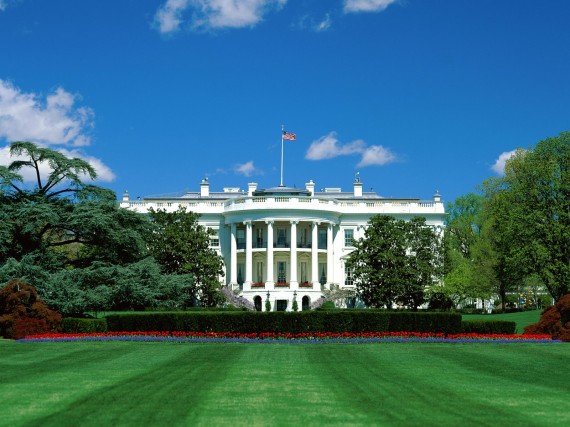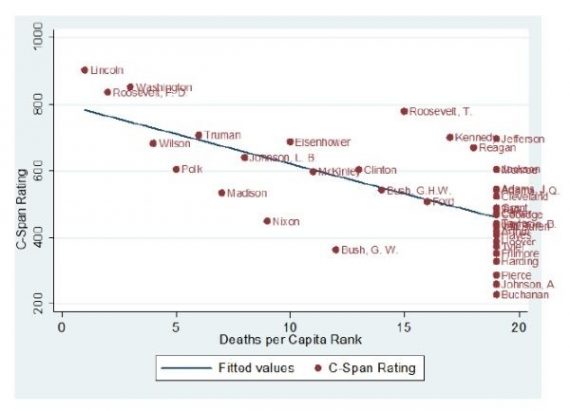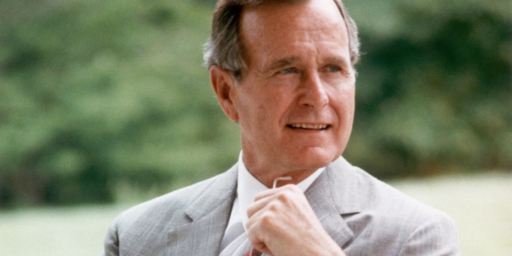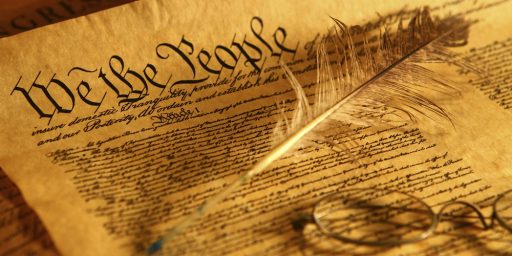War And The Presidency
According to some historians, a President isn't truly great unless he involves America in a bloody and destructive war.
The Washington Post’s Sarah Kliff links to new study that seems to suggest that historians judge a President more positively if they’ve been involved in a war that ends up killing a lot of Americans:
Our data analysis suggests that wars in which a large percentage of the U.S. population is killed will, all other things equal, cause historians to judge as great a president on whose watch those wars occurred. Certainly, this was the perception of presidents Theodore Roosevelt and John F. Kennedy. It was probably also the perception of other presidents.
The danger is that modern presidents understand these incentives. Those who want peace should take historians` ratings of presidents seriously. Beyond that, we should stop celebrating, and try to persuade historians to stop celebrating, presidents who made unnecessary wars. One way to do so is to remember the unseen: the war that didn`t happen, the war that was avoided, and the peace and prosperity that resulted. If we applied this standard, then presidents Martin van Buren, John Tyler, Warren G. Harding, and Calvin Coolidge, to name four, would get a substantially higher rating than they are usually given.
Here’s the chart showing the results they came up with:
Of course, there may be reasons not to praise Van Buren notwithstanding his peacemaking. The same goes for Warren Harding who, while apparently not personally corrupt, did preside over an Administration that permitted far too much insider dealing, something that largely ended when his Vice-President, Coolidge, took over after his sudden death. Additionally, many of the President’s judged as lacking by historians likely deserve that appellation notwithstanding the fact that they didn’t start a war. The ante bellum era, for example, is full of a rather unremarkable one term Presidents most of whom didn’t do much of anything and many of which weren’t even able to secure their party’s nomination for a second term. Indeed, sprinkled among those ante bellum Presidents is at least one candidate for the worst President in American history.
Nonetheless, the study does raise some interesting questions. I’ve noted before the rise of the Imperial Presidency, and the tendency of historians to view most positively those President’s who have expanded the powers of the Presidency far beyond the boundaries of Article II of the Constitution. Given that there is no greater tool for the expansion of Presidential power than war, especially in the modern era where declarations of war and Congressional oversight of Presidential war powers has been essentially non-existent, it’s not surprising that there’s a correlation between war and how historians view President’s. Of course, it’s worth noting that we’re taking about successful wars here. Neither Truman nor Eisenhower seem to benefit much in Presidential rankings from the Korean War, which ended in a stalemate. LBJ doesn’t get any benefit from Vietnam, quite obviously, and one doubts history will ever judge George W. Bush kindly. So as long as you’re a President who got involved in a war that resulted in a lot of people dying and is deemed successful, you’ll turn out okay in the eyes of history basically.
It is an odd standard by which to judge the effectiveness of our leaders, isn’t it?








I’m curious about the high score for Washington. I’m not aware that there were a large number of combat deaths during his presidency, were there? The Quasi War was really under Adams, there weren’t that many deaths in the Whiskey Rebellion – they’re not crediting him with Revolutionary War deaths, which obviously occurred prior to his presidency, are they?
Americans love a strong man. And I don’t mean Charles Atlas. It’s why we love men like Andrew Jackson and Teddy Roosevelt, but hate those like Chavez and Castro. We may not like their politics, but we are secretly jealous of their obvious strength and popularity. Winning wars is a sign of strength to us.
“Of course, it’s worth noting that we’re taking about successful wars here.” This is probably mostly true, but not entirely. If his wars didn’t count for something, how did W manage to beat five ex-presidents?
However, propinquity to the present also seems to carry some weight. It’s easy to have forgotten Millard Filmore, W less so.
I noticed this the other day, and commented elsewhere on the difference in perception between say a Lyndon Johnson and Ronald Reagan. Or, if you like, W.What that comes down to a simple management skills. it also comes down to the values that were fought for.
If that actually was the case then wouldn’t William McKinley rank as one of the top-5 greatest presidents in history, despite his presidency being cut short? The Spanish-American War was astonishingly successful for the U.S. Do we really believe historians have docked McKinley’s rating because that war didn’t involve enough U.S. casualties?
I suspect WaPo and that study are confusing factors with elements and further are conflating circumstances with proximate causes.
Lastly, as NoZe pointed out, the raw math of that study doesn’t make any sense. As President, Washington didn’t involve the U.S. in any major conflicts.
John Tyler . . . would get a substantially higher rating?
His accidency? The first unelected Presidency. The subject of the first impeachment proceedings? The only former President to join the Confederate government? Twice Traitor Tyler.
W had management skills? Even simple ones? He kept them well hidden.
This type of analysis has timing problems. The Civil War started under Buchanan and was largely the result of failed politics from several administrations and Congresses before him. The arch of Presidents from FDR to Truman to Eisenhower to Kennedy is one of decreasing combat, who is to blame and who takes credit?
And I agree what’s the deal with Washington’s score? I think they have to be blaming him for the American Revolution.
I remember my high school teacher was talking about presidential ratings a few years back. He made a point saying that presidents in very rough times were looked at better than presidents during peace times. Then he made a point saying that Bush II would be looked at better in the coming times if Iraq and Afghanistan stabilize in the near future. However, I don’t think Bush II would be looked favorably in the coming years and historians might rank him lower in the coming decades.
Oh, that you didn’t agree with the result is unquestioned, Anjin. You disagree with anyone to the right of Lenin, as a reflex reaction.
How about Reagan? I don’t recall much combat during his two terms. I do know that he and Nixon both were very pragmatic while talking tough.
Yes, Washington is being evaluated based upon his pre-Presidential war-mongering. From the study:
Also, the study does not count William Henry Harrison, someone would not have been president had he not been a military hero, but who is usually ranked at the bottom.
Interesting. The reason I work with start ups, entrepreneurs and Fortune 500 companies is that I am a commie? Gotcha.
Correct. I don’t think it was worth a trillion dollars to turn Iraq into a pro-Iran state. I don’t think that taking our eye off the ball in Afghanistan to turn Iraq into a pro-Iran state was sound policy.
Unless you are very, very selective in your reading, you know that I frequently praise President Reagan. But then we already knew that you are kinda challenged when it comes to telling the truth.
Is it possible that Lincoln made a big mistake by not letting the South go? I still haven’t figured out what was accomplished by “winning” the Civil War. We settled back in to 100 years of apartheid, segregation and Jim Crow Laws. Seems like we paid a big price for that “victory.”
Okay … I’m just kidding … sort of …
>Washington is being evaluated based upon his pre-Presidential war-mongering…
That strikes me as quite an exception, one that has to cast the validity of this methodology into question. If we’ve got different rules for different presidents, then there’s no way to compare them and it looks like they just massaged the results so that Washington would come out near the top. If Washington gets “credit” for Revolutionary War deaths, then why is Grant not “credited” with Civil War deaths or Eisenhower with WWII deaths?
And PD, the first shots of the Civil War were fired in April 1861, more than a month after Buchanan had left office…